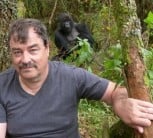Researchers at the University of Pretoria form part of the Kalahari Meerkat Project in the Northern Cape's Kuruman River Reserve, which has studied groups of wild meerkats for over 20 years.
Meerkats are fascinating animals that display intricate social behaviour. They live in groups of between four and 35 individuals and each group is governed by a dominant breeding pair that sires up to 90% of the surviving offspring. Other individuals in the group are subordinate to the dominant individual of the same sex. Subordinate mammals display high levels of co-operative behaviour, helping in pup raising and feeding. Despite their co-operative behaviour and assistance in things like pup-feeding and babysitting of the dominant pair's offspring, the dominant female is aggressive towards subordinates, causing high levels of stress among the subordinate females.
This project was started by Professor Tim Clutton-Brock, extraordinary Professor at UP and director of research of the Department of Zoology at the University of Cambridge. The KMP is a collaboration between the University of Cambridge, the University of Zurich and the UP Mammal Research Institute (MRI). It is managed in South Africa by Dr David Gaynor of the MRI and is focused on better understanding co-operative behaviour in these animals in order to gain greater insights into the social structures of mammals.
Recent studies within the project have focused on gaining novel insights into the maintenance of co-operative behaviour. UP researchers from the MRI, including Prof Nigel Bennett, and Professor André Ganswindt, Director of the MRI, in collaboration with other researchers in the KMP, simultaneously investigated multiple social, environmental and individual factors that affect stress levels of subordinate meerkats.
The study explored whether conflict between dominant and subordinate meerkats affect alloparental care by altering the levels of the stress hormone cortisol. This was assessed by looking at how the stress hormone cortisol affects assistance from subordinates with pup-feeding and babysitting, and what role food availability and other characteristics of the social group play in the levels of stress hormones in subordinate meerkats. By assessing stress levels in these different scenarios, more insight was gained into social conflicts and the cost of co-operation.
While both male and female subordinates endure higher levels of stress than dominant meerkats, it appears subordinate females display the highest levels of cortisol in their plasma, suggesting stronger competition between members of this sex. Cortisol is a hormone involved in the regulation of metabolism in cells and helps to handle stress within the body. It is part of the group of hormones known as glucocorticoids. Through observations and by measuring glucocorticoid levels, it was evident that dominant females exert a lot of aggression on other females. Findings show very high levels of aggression directed to subordinate females when the dominant female is pregnant. Previous studies conducted by the KMP suggest that this is because the subordinate pups compete with the pups of the dominant pair and subordinate females may kill these pups to favour the survival of their own. It appears that dominant females avoid this by evicting older subordinate females from the group before giving birth. In all these instances, it was found that subordinate females experienced escalated glucocorticoid levels in their systems.
Based on these findings, the KMP evaluated whether dominants direct aggression strategically to manipulate cortisol levels to increase the co-operative behaviour of subordinates. Their findings, however, do not show this to be the case. Although cortisol levels significantly affect participation in co-operative behaviour, it is not in a simple consistent way. Low levels of cortisol increased babysitting behaviour among subordinates of both sexes. For pup feeding, high levels of cortisol increased this behaviour in subordinate males, while low levels of cortisol receptor activity resulted in increased pup feeding among females. Dominant female meerkats did not adjust their levels of aggression to strategically enhance co-operative behaviour among subordinates. It appears that the function of aggression directed at subordinates is predominantly to stop them from breeding rather than to force them to co-operate.
By gaining greater insights into the social structures and behaviours of meerkats, Dr Gaynor and the KMP hope to improve future conservation practices of wildlife populations. The project continues to follow about 300 meerkats in the reserve on a daily basis, enabling the project to provide detailed information on how interaction between individuals lead to higher stress levels, and to measure the effect of different individual behaviours on the lifetime reproductive success.
Click on the gallery in the sidebar to view more from the Kalahari Meerkat Project.
Professor Tim Clutton-Brock, Dr David Gaynor, Prof Nigel Bennett & Professor Andre Ganswindt
November 8, 2017


 Story
Story
This edition is curated around the concept of One Health, in which the University of Pretoria plays a leading role globally, and is based on our research expertise in the various disciplines across healthcare for people, the environment and animals.
 Story
Story
A new study by researchers at the University of Pretoria (UP) and the University of Adelaide in Australia has revealed the real function of the giraffe’s long legs ¬– to reduce blood pressure.
 Infographic
Infographic
This infographic explains the long and short of a giraffe's legs. By having long legs, the giraffe is able to reduce the pressure it needs to get blood to its brain, thereby saving the animal energy.
Copyright © University of Pretoria 2025. All rights reserved.
Get Social With Us
Download the UP Mobile App